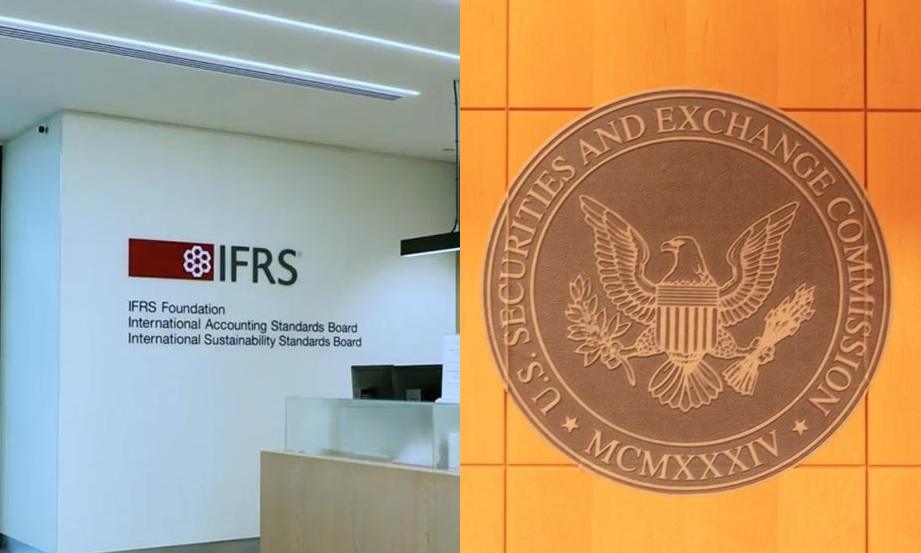The U.S. Securities and Exchange Commission (SEC) may reconsider its rules allowing foreign companies to file financial statements using International Financial Reporting Standards (IFRS) accounting standards due to the IFRS Foundation’s formation and backing of the International Sustainability Standards Board (ISSB), according to a warning issued by SEC Chair Paul Atkins on Wednesday.
The remarks, made during Atkins’ keynote address at the inaugural OECD Roundtable on Global Financial Markets, form the latest in a series of moves by the SEC since beginning of the Trump administration to push back on increasing requirements for corporate sustainability and climate reporting globally, including a recent announcement by the Commission that it would not defend its own climate reporting rules – established during the Biden administration – in court.
The IFRS Foundation established the ISSB in 2021, with the goal to develop IFRS Sustainability Disclosure Standards to provide investors with information about companies’ sustainability risks and opportunities. The IFRS released the inaugural general sustainability (IFRS S1) and climate (IFRS S2) reporting standards in June 2023, which have become the basis for sustainability reporting frameworks in more than 35 jurisdictions so far.
At the time of the ISSB’s formation, the IFRS Foundation announced that it would sit alongside the IASB, with both boards overseen by the IFRS Foundation Trustees. The IFRS Foundation also stated that the boards will be independent, and will work in close cooperation to establish complementary standards to provide comprehensive information to investors and other providers of capital.
The SEC issued a ruling in 2007, removing a requirement for foreign issuers filing reports in the U.S. to reconcile financial statements with US GAAP, if the statements were prepared using IFRS Accounting Standards as issued by the IFRS Foundation’s International Accounting Standards Board (IASB).
In his remarks, Atkins notes that he was an SEC Commissioner at the time and supported the rule change, but added that one of the key considerations in the decision was “the IASB’s sustainability, governance and continued operation in a stand-alone manner as a standard setter,” and particularly “the ability of the IASC Foundation, which was the predecessor to the IFRS Foundation, to obtain “stable funding” for the IASB.”
With the IFRS Foundation’s trustees now responsible for securing funding for both the IASB and the ISSB, Atkins warned that “this recent expansion of the IFRS Foundation’s remit cannot divert its focus from its long-standing core responsibility of funding the IASB,” adding that the IFRS’ standards should “not used as a backdoor to achieve political or social agendas.”
Atkins then stated:
“If the IASB does not receive full, stable funding, then one of the underlying premises for the SEC’s elimination of the reconciliation requirement for foreign companies in 2007 may no longer be valid, and we may need to engage in a retrospective review of that decision.”
In an emailed statement provided to ESG Today, an IFRS Foundation spokesperson said that “’the IFRS Foundation was asked to establish the ISSB in response to investor and capital market demand globally for financially material sustainability-related financial disclosures. The IASB and the ISSB operate and are funded independently – a key consideration when the ISSB was established – whilst their respective standards do not impose requirements on each other,” and noted that it was “midway through a two-year transformation programme to ensure we are efficient and effective in delivering for capital markets, including the development of our long-term funding strategy.”
The IFRS Foundation spokesperson added:
“The SEC is an important stakeholder and we continue to maintain close dialogue with its leadership and staff. The IFRS Foundation was created over two decades ago to enable the disclosure of financially material information for the capital markets and remains focused on this task.”
Atkins also noted “significant concerns” with the EU’s new sustainability reporting and due diligence regulations, including the CSRD and CSDDD, due to the double materiality approach applied by the laws, which requires reporting both on the risks and impact of sustainability issues on an enterprise, as well as on the enterprises’ impacts on environment and society, with the SEC Chair stating that “these laws also impact U.S. companies with operations in the EU.”
While noting that he was encouraged by a commitment announced last month by the EU to ensure that the CSRD and CSDDD “do not pose undue restrictions on transatlantic trade” and by the EU’s Omnibus process to simplify the rules, he added that “further work remains to refocus regulatory regimes on the principle of financial, instead of double, materiality.”

